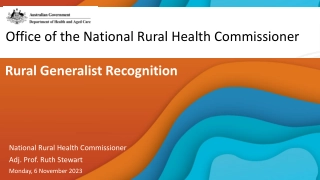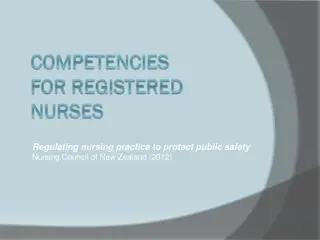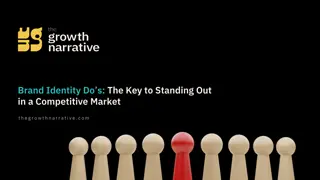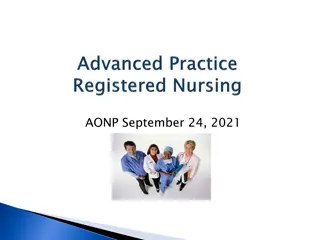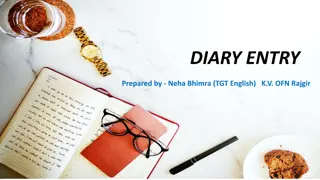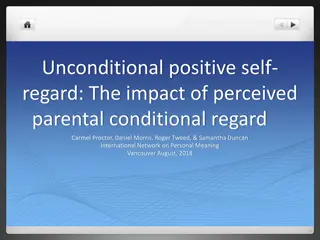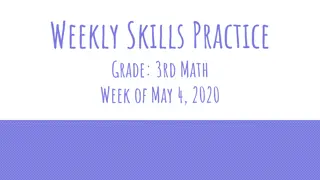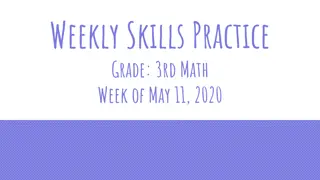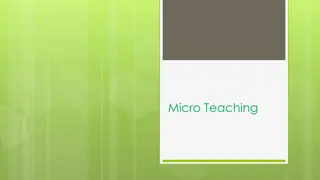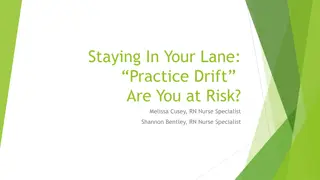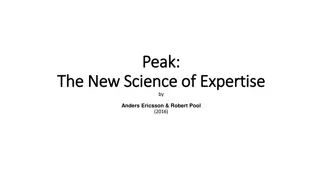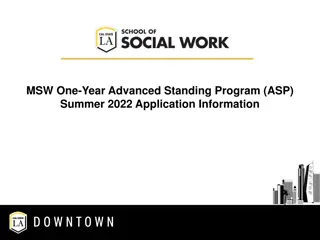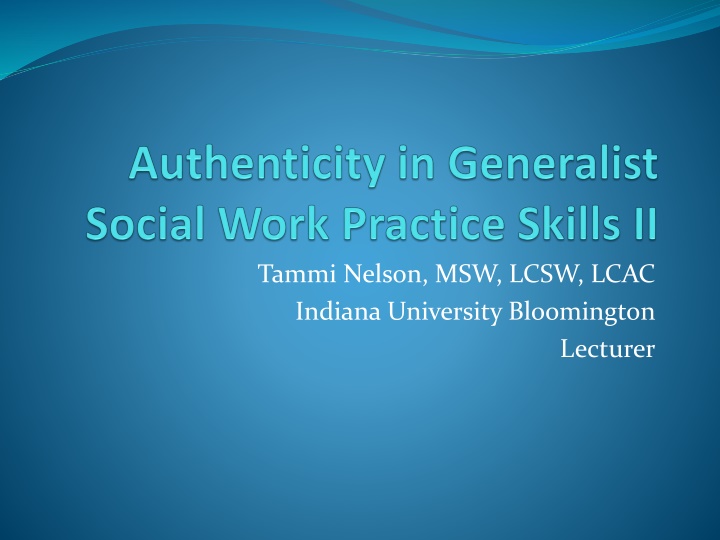
Enhancing Social Work Skills through Peer-Client Experiences
Explore the evolution of social work education at Indiana University Bloomington under the guidance of lecturer Tammi Nelson, MSW, LCSW, LCAC. The transition from role-playing to authentic experiences, emphasizing ethical decision-making and client rapport in Peer-Client meetings. Comparison of teaching methodologies from 2013 to 2014, focusing on the integration of Peer-Client experiences. Discover the significance of genuine engagement, unscripted skills application, and professional practice in the context of ethical dilemmas. Dive into assignments where students are paired as Peer-Clients within the same classroom setting.
Download Presentation

Please find below an Image/Link to download the presentation.
The content on the website is provided AS IS for your information and personal use only. It may not be sold, licensed, or shared on other websites without obtaining consent from the author. If you encounter any issues during the download, it is possible that the publisher has removed the file from their server.
You are allowed to download the files provided on this website for personal or commercial use, subject to the condition that they are used lawfully. All files are the property of their respective owners.
The content on the website is provided AS IS for your information and personal use only. It may not be sold, licensed, or shared on other websites without obtaining consent from the author.
E N D
Presentation Transcript
Tammi Nelson, MSW, LCSW, LCAC Indiana University Bloomington Lecturer
From Role Plays to Authenticity Role plays Practice specific skills from one class to the next Engage in the feedback process from the Role-Play Client Time limited to 5-20 minutes within the classroom Depth of engagement limited to surface discussions Role plays topics scripted
Role Plays to Authenticity Authentic experience Practice specific skills in classroom Role plays Apply skill in Peer-Client meetings as the benefit of use arises. Feedback in class role plays applied to Peer-Client meetings Peer-Client meetings conducted out-of-class Depth of engagements in Peer-Client experience reached 6 of 10 Superficial Genuine need in emotional context Core personal
Comparison 2013 to 2014 S331 Generalist Social Work Practice Skills I Fall S332 Generalist Social Work Practice Skills II Spring 2013-2014 Academic Year Teaching provided via lecture, classroom activities and homework 2014-2015 Academic Year Teaching provided via lecture, classroom activities and homework in fall; Peer-Client experience added in the Spring
Fall to Spring All units were taught similarly from one year to the next Addition to unit lessons in 2014 included application of the ethical decision making and case examples likely to occur in Peer-Client experience Specific unit added to address Informed Consent, Confidentiality between peers, with instructor and for assignments Students were provided Supervision by appointment and follow up process for grievances.
Authenticity Genuine engagement Unscripted Skills application in meetings Ethical decision making Professional practice Ethical dilemma s Client rapport, depth of exploration, goal setting and evaluation Peer-Client Experience
Assignments Each student was assigned a Peer-Client Peer-Clients were assigned based on student designation of peers they were acquainted with but not close to socially Students were assigned within the same classroom, not cross sections
Preparation for Assignments Documentation units same each year 2014 Addition of Progress Notes and Journals Rubrics for assignments same each year Instructions were the same each year Changes from 2013 to 2014 included: Informed consent forms requiring signatures Confidentiality forms requiring signatures Lesson in ethical decision making and behavior specific to engaging with a Peer-Client Supervision process Grievance process
Student Challenges Confidentiality and dual relationships Client versus social relationships Social considerations Ethical considerations Confidentiality with instructor Student Time outside of class Commitment to professionalism and responsibility to Peer-client
Instructor Challenges Instructor knowledge and grading Grading and feedback time increased for instructor Instructor time for supervision Identification of student crisis increased requiring instructor follow up
Management of Challenges Supervision between student and instructor Ethical decision making discussions in class Identification of Students with ethical and professional challenges and greater supervision commitment Each students assignment was confidential from instructor and not kept. Room reservations for Peer-Client meetings Assignment feedback to apply to ongoing Peer-Client meetings
Outcomes N= 47 N=42 M=1; F=46 M=3; F=39 Assignments 2013 2014 Initial Assessment (20) 17.69 17.87 Goal Setting (20) 17.85 18.43 Termination Plans (20) 18.19 19.9 Professionalism (50) 47.5 47 Mean points per assignment
Surprising outcomes Specific student-lead discussions around ethical and professional behavior in and out of class More accurate assessment of students interpersonal skills More accurate assessment of students application of knowledge base Clarity of student skills and abilities in planning for practicum Earlier identification of students in trouble Application of Practice Behaviors from CSWE
Student reflections Some challenges that I have experienced are maintaining professionalism . . .however we have tried to help with setting boundaries. Successes are that we have made a lot of progress working through her goals.
The past few weeks I have been more aware of what I am saying and making sure that I am not giving the client advice. This was difficult for me . . . Even though the client may meet with you each week hoping to talk about something different, this experience taught me how to revisit past goals, and try to tie them into new ones that we were trying to set.
Before starting this peer/client project, I was really nervous that I would have trouble figuring out what to say. However this assignment has really helped! I love the relationship my client and I developed, and I really saw the progression. At first it was challenging for me to relate to my client, she was a bit quiet and I was uneasy with what I would say, but as the session continued I could tell my client felt comfortable with me.
I think that this meeting was the most successful one that my client and I had. It finally felt like we were equals in this process and that my client was fully open with me. We were also able to address the origins of some of the constructs that she holds true in her life and this seemed very beneficial for her. We also addressed potential risk factors to her not maintaining her goals.
Planned changes Fall semester critical thinking challenges will increase. Journals accompanying Progress Notes will address successes and challenges rather than a review of skills. Fewer assignments, but greater feedback.
Assessment of Practice Behaviors to provide feedback and student correction prior to practicum Supervision with struggling students will be required Peer-Client assignments will be cross-section only Classroom reflections in skills and knowledge applications.
Thank you Tammi Nelson Indiana University Bloomington School of Social Work tamlnels@iupui.edux

